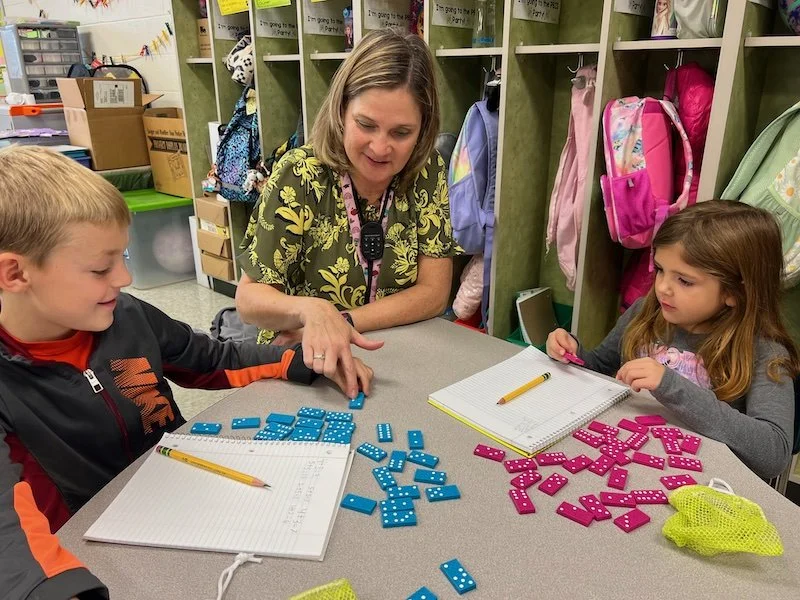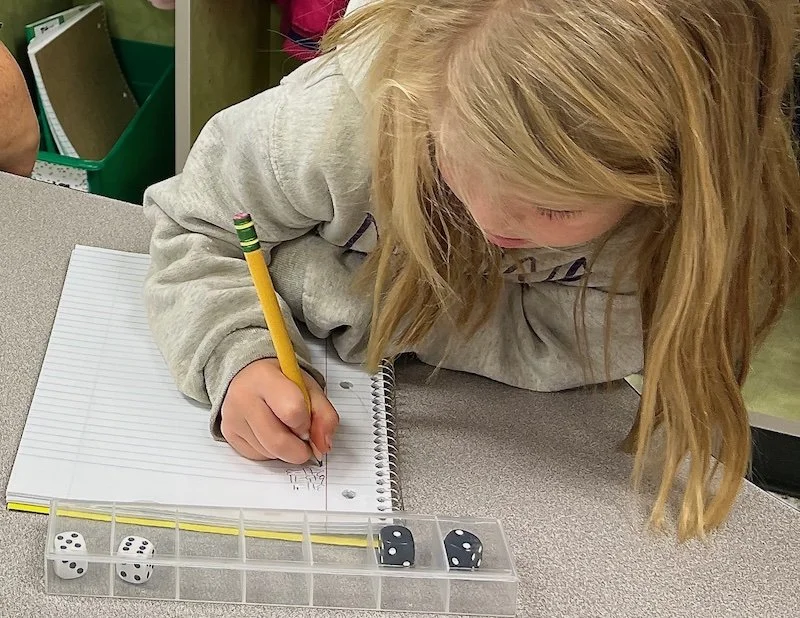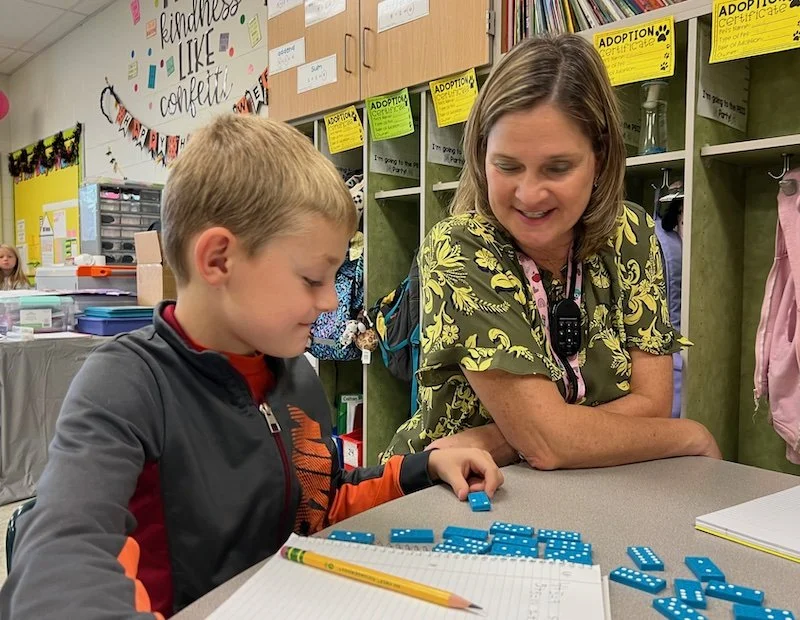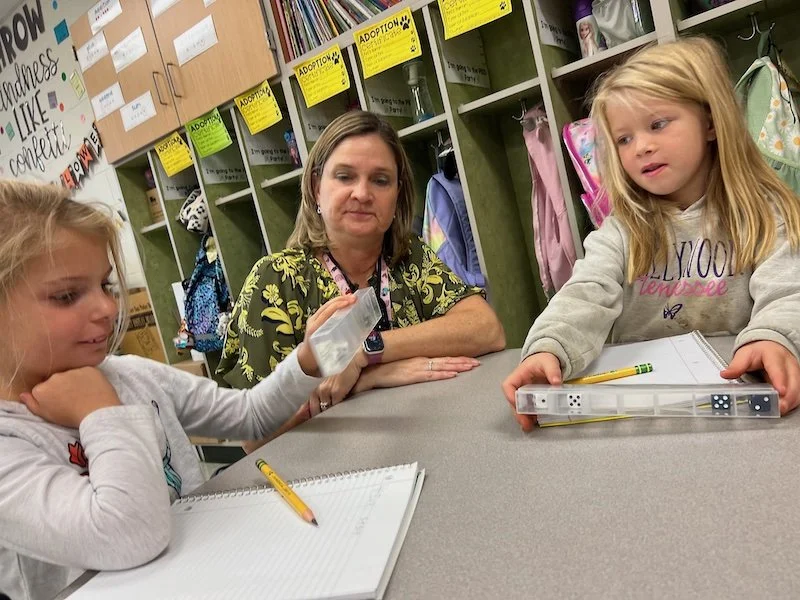Making Math Matter
With the guidance and support of a math specialist, teachers, such as Dara Timmerman (above) at Norwayne Elementary School in Creston are discovering strategies and tools to help children build a strong sense of numbers. Teachers carefully design lessons that are enriching, teach critical thinking skills, and promote student-centered learning.
“Bringing in a math specialist to a small, rural district has been life-changing.”
-Ann Gerber, Curriculum/Gifted Coordinator, Norwayne Local Schools
Norwayne Local Schools is committed to developing mathematical thinkers. With support from the Martha Holden Jennings Foundation, the district is working with all elementary teachers to shift from “how” to “why” in their practice. The goal is for students to gain a deeper conceptual understanding of mathematics and not just “do” math for procedural knowledge.
“Our recent Ohio One Needs Assessment showed that our district was struggling in certain areas of math, particularly in number sense,” explains Ann Gerber, the district’s Curriculum/Gifted Coordinator. “We needed a more systemic approach to help students with interventions in math.”
With Covid-era funds, Mrs. Gerber contracted with math specialist Emily Kappel of Kappel Consulting to work onsite periodically with elementary teachers to help them design student-centered math lessons. The positive results led Mrs. Gerber to request a grant from the Jennings Foundation to expand on this work. The district would use the funds for professional development, onsite consulting, and the purchase of hands-on materials for each elementary classroom.
“We need to develop our students’ learning habits through fun and engaging lessons and activities that will get them thinking like mathematicians,” Mrs. Gerber explains in the grant proposal. "Students benefit from completing daily number sense routines and teachers need strategies to take problem-solving to the next level, stimulate mathematical thinking, and encourage creativity and collaboration.”
With Jennings funds, the district sent ten teachers to Kappel Consulting’s two-day Digital Number Sense SUMmit, which was held in June. Emily Kappel was the lead instructor, and the program was open to math teachers from across the state. Participants from Norwayne Elementary included a top math tutor, a first-year teacher, and veteran educators with 30- plus years of experience. Sessions were differentiated for grades K-2 and 3-5 and included topics such as Daily Number Sense Routines: Focus on Place Value; Daily Fraction and Decimal Routines; Moving Beyond Facts to Add & Subtract; and Playing Around with Dominoes.
In addition to learning many hands-on strategies designed to stimulate deeper mathematical thinking, participants could network with colleagues outside of their district during the Zoom sessions. The summit included twenty hours of recorded professional development, which teachers can refer to as they introduce these activities in their classrooms.
When the teachers returned to school in the fall, each elementary classroom was stocked with manipulatives featured during the summer program, doubling the amount of classroom materials available previously. These include dominoes, expandable rulers, dice, card games, and teacher resource books. Ms. Kappel visited Norwayne Elementary in September and has scheduled two additional visits on staff development days to work with teachers in person. Onsite, she presents in-services on data analysis, making word problems make sense, number talks, and differentiated math strategies. She addresses teachers’ concerns, designs hands-on activities using manipulatives, and collaborates with teachers as they learn how to use the materials for intervention and enrichment purposes.
Dara Timmerman uses the new math materials daily in her first grade classroom at Norway Elementary School.
“Bringing a math specialist into our small, rural district has been life-changing for us,” explains Mrs. Gerber, noting that the project is impacting all 600 elementary students and 19 elementary teachers in the district.
“We have an intervention period every day in every grade level,” she continues. “The students learn not only how to do mathematical computation, but they also understand the why behind it. Teachers work on number sense every day, and the students’ understanding is much more evident. That is a huge change for our district.”
Dara Timmerman, who has been teaching for 31 years, is thrilled to have the materials in her classroom. “These manipulatives can be used in multiple ways,” she remarks. “They are concrete. They are easily accessible. They teach children how to play a game, how to be fair, and how to play for learning. It’s helped me teach because I don’t have to rely on students just listening to me, which is inappropriate for first graders. They need to use their hands and other senses to learn.”
Students work in groups and learn problem-solving skills while playing with the math manipulatives.
Mrs. Gerber reiterates that teachers like having “ready-to-go” resources and that students are eager to use them. “The teaches aren’t digging for ideas on how to put them to work,” she says. “They have a booklet of ideas, they have the training, and they understand the research behind why it’s useful.
“The materials are attractive and the students are asking to use them. They don’t realize they are learning because they are having so much fun.”
While reflecting on the progress Norwayne Local Schools has made in prioritizing mathematical thinking in its elementary classrooms, Mrs. Gerber has advice for educators who have similar goals: “Never think it’s impossible to do something. There are people who will support you, but you have to be determined. We had a vision we wanted to fulfill, and there was a way to do that. Just be determined.”





